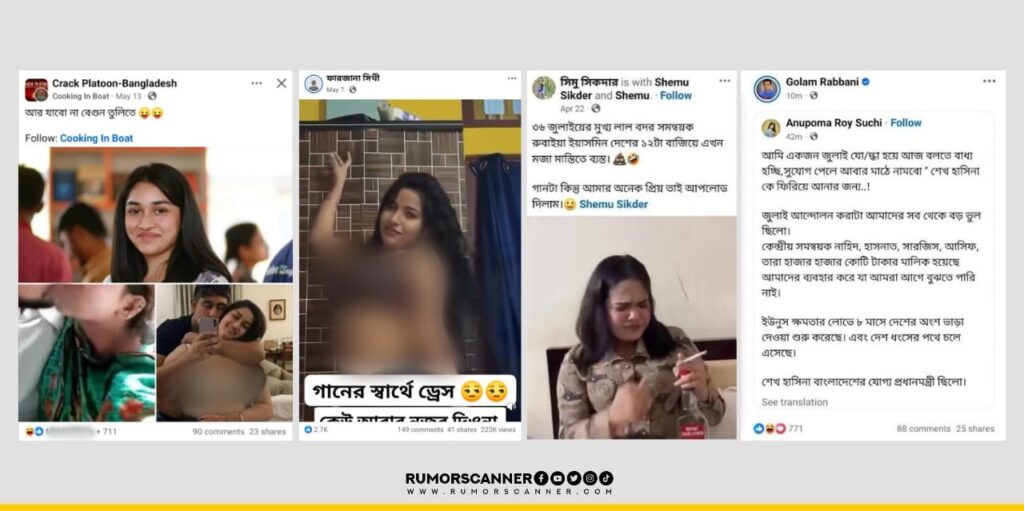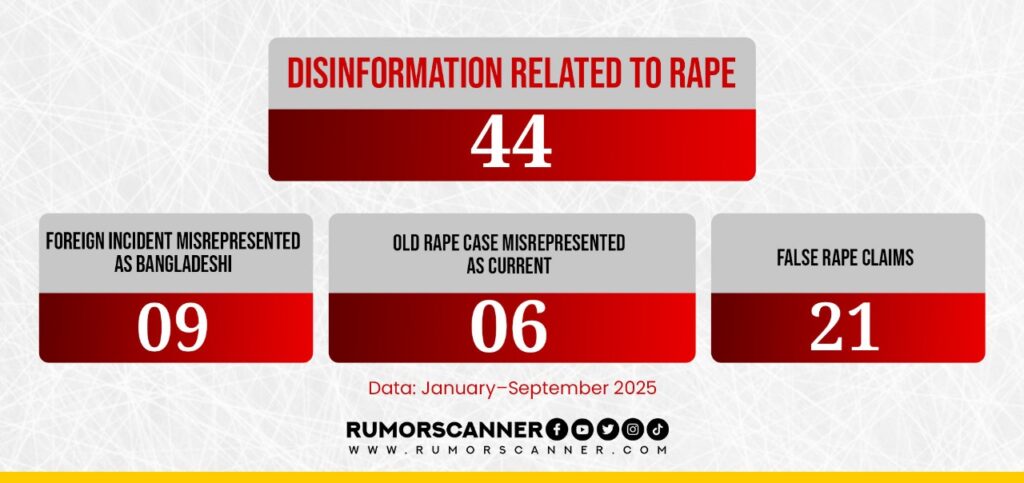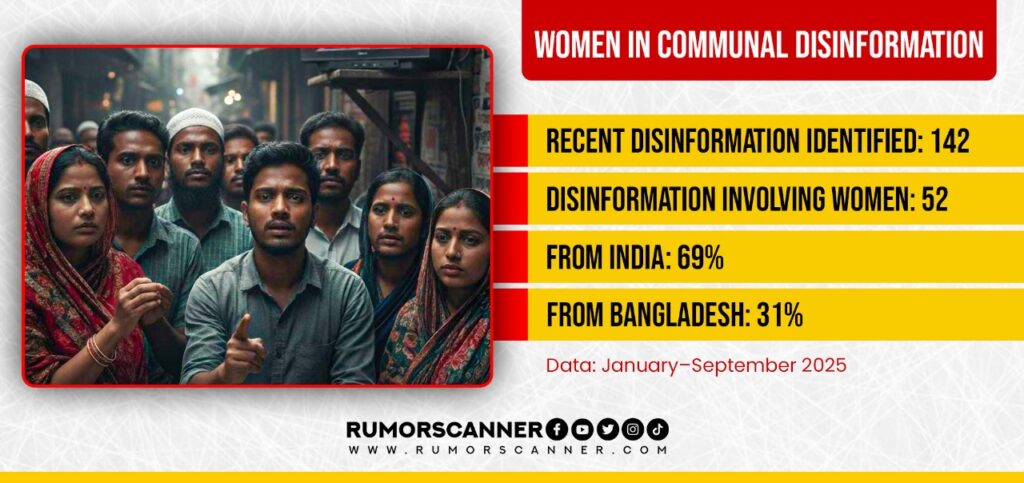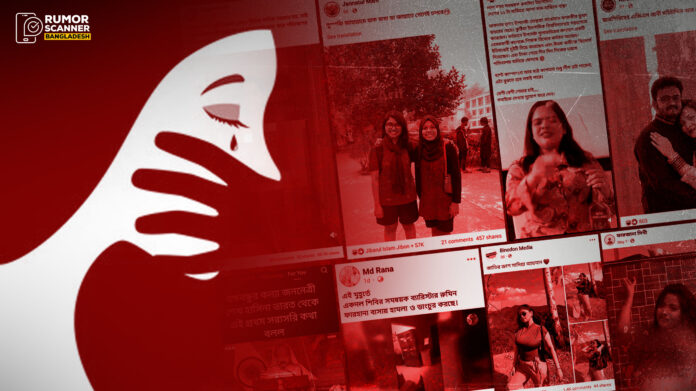- 21% of misinformation identified in nine months involved women.
- During this period, 567 pieces of misinformation involving 276 women were identified.
- 237 pieces of disinformation were spread involving 25 female politicians.
- Misinformation was also spread involving two female advisers.
- 68 pieces of disinformation were identified involving 29 female stars from the entertainment world.
- Continuous promotion of fake videos and photos of different women using the false identity of a coordinator.
- Misinformation in 44 incidents related to rape involving women.
- Bangladeshi media involved in 13 incidents and Indian media in 3.
- 37% of communal disinformation incidents involved women. The most propaganda came from Indian accounts.
The spread of disinformation surrounding women in Bangladesh is now being identified as an alarming social and digital problem. A trend of distorting and presenting women’s images, identities, or statements in political, social, or personal contexts is noticeable. Often, fake content is created in women’s names and spread on social media, with the intention sometimes being character assassination, sometimes denigration, and sometimes creating confusion in the public mind. This disinformation not only causes personal harm but also puts women’s social status, security, and participation in question. As the use of information technology expands, this form of digital violence against women is becoming more apparent. In this context, it has become essential to analyze the source, type, and impact of disinformation. Rumor Scanner’s analysis has revealed that at least 21% of the rumors identified between January and September of this year were about women. During this time, Rumor Scanner identified at least 567 pieces of misinformation involving at least 276 women. The victims of this misinformation include well-known individuals from various fields such as politics, entertainment, and national affairs. Even many ordinary women are regularly becoming victims of such misinformation.
The Dark Shadow of Disinformation on Women in the Political Arena
The spread of misleading and false information about women in the national and political spheres of Bangladesh is now a visible reality. Fake statements, edited videos, or AI content are spread on social media using women’s names or photos, creating false impressions about them. Sometimes, attempts are made to increase credibility by disseminating this information in the name of the media. As a result, women’s personal and social dignity is undermined, and their participation in the public sphere is likely to be hindered.
Rumor Scanner’s observation has shown that in the last nine months, at least 237 pieces of disinformation have been circulated involving 25 female leaders and activists from at least seven political parties and their affiliated organizations. Among them, the highest amount of disinformation, 188 instances, was spread involving women associated with the currently banned Awami League. The most rumors were spread about the party’s president, Sheikh Hasina. 148 pieces of disinformation were circulated about this woman, who was ousted from power and is taking refuge in India. To understand the nature of this disinformation, Rumor Scanner has divided it into two separate categories. Considering the promotion of disinformation that favors Sheikh Hasina as positive and that which goes against her as negative, Rumor Scanner found that in about 88% of these cases, Sheikh Hasina was presented positively. Most of this disinformation (29%) was centered on old videos, which were promoted as current events of this year. Sheikh Hasina has not been seen in public since August 5. In this context, old videos claiming she was seen in various places in India or had returned to the country were run in a campaign-like manner. This has also increased the number of disinformation instances next to her name. Besides Sheikh Hasina, 21 more pieces of disinformation were circulated in these nine months involving three other female members of her family (daughter Saima Wazed Putul, sister Sheikh Rehana, niece Tulip Siddiq). Additionally, Rumor Scanner identified disinformation circulated involving the party’s leaders Dipu Moni (1), Momtaz Begum (4), Selina Hayat Ivy (3), and Jannat Ara Henry (1). At least 10 other pieces of disinformation were found identifying the individuals only as female leaders/activists of the party without mentioning any names.
In February, the country’s new political party, the National Citizen Party (NCP), was officially launched. The party has several female members at the leadership level. These women had been in the spotlight to some extent since last year due to their participation in the July movement. After entering politics, Rumor Scanner has noticed a regular spread of disinformation involving them. In nine months, at least 32 pieces of disinformation have been identified involving seven female leaders of this party and its affiliated organizations. Among them, 19 were spread about the party’s senior joint member secretary, Tasnim Jara. Eight of these pieces of disinformation contained offensive and sexually suggestive scenes. Additionally, six pieces of disinformation were identified involving Nusrat Tabassum, three involving Samantha Sharmin, and one each involving Humayra Nur, Tajnuva Jabeen, Arpita Shyama Deb, and Shyamoli Sultana Jadni. At least two other pieces of disinformation were found identifying the individuals only as female leaders/activists of the NCP without mentioning any names.
In the last nine months, at least 23 pieces of disinformation have been identified involving at least eight female leaders and activists of the Bangladesh Nationalist Party (BNP) and its affiliated organizations. Among them, the number of identified disinformation instances involving the party’s central committee’s assistant international affairs secretary, Rumeen Farhana, is nine. These pieces of disinformation included fake statements, AI-generated fake images, as well as attempts to create confusion using old videos. Besides Rumeen Farhana, disinformation was also seen circulating this year involving Begum Khaleda Zia (8), Zaima Rahman (1), Dr. Zubaida Rahman (1), Nipun Roy Chowdhury (1), and Mansura Alam (1). Additionally, at least two other pieces of disinformation were found identifying the individuals only as female leaders/activists of the BNP without mentioning any names.
Among other parties, two pieces of disinformation were identified involving Lucky Akter, a leader of the Communist Party of Bangladesh (CPB), two involving Fatima Tasnim Juma of the Inqilab Moncho, one involving Socialist Students’ Front leader Sohagi Samia, and one using the identity of Tanni, the alleged women’s affairs secretary of the Gono Odhikar Parishad’s Dhaka Metropolitan South unit.
Samantha Sharmin, the senior joint convener of the National Citizen Party (NCP), tells Rumor Scanner, “In the case of frontline female politicians, what I have seen is that rumors or false information about corruption become believable to many. However, in cases like molestation, many may not believe that they could do it or that it could have happened.” Samantha thinks that these issues are very problematic for those who work at the district or upazila level because the marginal population at that level believes these rumors. In that case, the social or familial impact is tremendous.
Regarding the targeting of women in the spread of disinformation, Samantha opines, “It seems to me that if we are attacked or if we are such victims of it, then other women will not have the hope or courage to come this way. This is happening from a strategic point of view.”
She was telling Rumor Scanner, “The rumors are being spread with a target. This is being done to reduce the capability of female politicians who are involved in the decision-making process and have credibility in the political arena.”
She urges fact-checkers to spread these kinds of works to the marginal level as well. The young female politician believes that all political parties, including the NCP, should work on awareness at the village level on various surrounding issues, including combating rumors.
Outside the political arena, ten pieces of misinformation were identified in the last nine months involving two female advisers of the current interim government. Among them, evidence was found of nine pieces of misinformation being spread involving Syeda Rizwana Hasan (two of which were offensive and one was AI content) and one involving Farida Akhter. Additionally, at least one piece of misinformation was identified involving Lamiya Morshed, the chief coordinator for SDG affairs to the chief adviser.
Women in Entertainment are Major Victims of Fake AI Content
Women in the entertainment world are becoming one of the biggest victims of false information or disinformation spread through digital media in Bangladesh. Misleading or false information is being spread using the names, identities, and photos of actresses, models, presenters, and social media influencers—which includes fake videos, content created by artificial intelligence or AI, sexually suggestive content, or death hoaxes. In the first nine months of this year, Rumor Scanner has identified at least 68 pieces of disinformation involving 29 female stars from the entertainment world. Among them, the use of AI or digital technology was observed in 50 pieces of content. In 36 cases of this fake content, footage of Indian women was used, which was spread with the claim of being photos or videos of Bangladeshi entertainment stars.
In the entertainment world, actress Sadia Ayman has been the biggest victim of disinformation in the last nine months. Out of 11 fake pieces of content circulated involving her, 10 were AI-centric. Sadia informed Rumor Scanner that she is also aware of the matter. During a conversation with Rumor Scanner, she said, “Those who are doing this are committing a terrible crime.”
Regarding legal action against the fake content, Sadia Ayman believes that instead of seeking a solution individually, all those who are facing this problem should unite to find a solution to this issue.
When asked whether women in Bangladesh, especially well-known women in politics and the entertainment world, are being specifically targeted by rumors in the post-July movement period, Sadia Ayman said, “I spoke in favor of the July movement. I did not do it from a political standpoint. I have no interest in politics. I like to speak for justice or speak out against injustice. It is true that after the July movement, I or a few others who spoke in favor of it have faced problems. I will not say that those who were against the July movement did this. I don’t really know who did it. The AI thing that is going on, I also think that some party or opposition is doing it knowingly. I still get a lot of comments and messages on social media, which makes it clear that I am hearing such things now because I was vocal during the July movement. But it’s okay. I know that the truth will come out eventually. People know what I am really like or what I have spoken about, what I have spoken for or against. There is nothing new to clarify. It is true that those who were in favor of it are facing some problems, some obligations. I hope it will be resolved. I think it is a temporary issue. That’s all.”
Among the stars in the entertainment world who have been victims of more than one piece of disinformation this year are Nusrat Imrose Tisha, Meher Afroz Shaon, Azmeri Haque Badhon, Prarthana Fardin Dighi, Tanjim Saiyara Totini, Bidya Sinha Saha Mim, Tasnia Farin, Mahiya Mahi, Shobnom Bubly, Apu Biswas, Pori Moni, Naznin Nahar Niha, Rafiath Rashid Mithila, Mehazabien Chowdhury, and Sabnam Faria.
Continuous Propaganda Involving Female Activists
During the movement of July-August last year, the Anti-discrimination Students’ Movement became a prominent name in the country. This organization led from the front from the quota movement to the fall of the government. Subsequently, a regular spread of false information involving this organization has been observed. Rumor Scanner has found evidence of 32 pieces of disinformation being circulated this year involving at least eight female activists who participated in this movement. Among them, 15 fake videos were spread involving Farzana Sithi. Except for one, the rest were video footage created using AI and deepfake methods. Additionally, seven pieces of disinformation were spread involving the platform’s former central coordinator, Umama Fatema. Rumor Scanner has identified five pieces of disinformation involving Nafsin Mehnaz, a student of North South University and a July movement activist, three of which claimed to show Nafsin in compromising situations. Besides, one piece of disinformation each was identified involving Samia Masud Momo, Tilottama Iti, Sabrina Afroz Sabonti, Athina Tabassum Mim, and Anika Tasnim.

Beyond these, this year has seen rampant propaganda through video footage of different women using fake names and identities of a coordinator and a July warrior. Sixteen such incidents have been identified. Seven of the photos and videos spread in these incidents were from India, and three were from three other different countries. The rest were from Bangladesh, but were old and from different incidents. None of them were coordinators, nor were they involved in politics.
An example of how women become victims of coordinated political propaganda was also seen this year. In April, on a single day, at least five pieces of content went viral centered on a woman named Rubaiya Yasmin, identifying her as a coordinator. At least one of these pieces of content was offensive. This woman was also promoted as a leader of the Jatiya Nagorik Party by supporters of almost all other active parties in the country at that time. Such coordinated promotion of disinformation is rare in Bangladeshi politics. Rumor Scanner’s investigation found that this woman’s name is not Rubaiya Yasmin, and there is no coordinator by that name. This woman, named Yuthi, is also not involved in any politics.
Women in Rape Misinformation
This year in Bangladesh, at least 44 incidents of misinformation spread involving women were related to rape. Analyzing this misinformation shows that in about 48% of the cases, there was no evidence of rape at all. Yet, the claims were spread as incidents of rape. Besides, two claims came to Rumor Scanner’s attention in February, one of which claimed that 72 rape incidents occurred in Bangladesh in the 65 hours preceding February 23. In this incident, at least two mainstream media outlets (Janakantha, Manobkantha) were also seen promoting the same claim. Even the official Facebook page of the banned party Bangladesh Awami League promoted the claim. However, Rumor Scanner’s investigation at the time found that at least eight rape allegations were received within that timeframe, which is about eight times less than the claim. The other claim that was spread, which edited and promoted a photocard of an online media outlet, was that 100 rape incidents occurred in 73 hours. No basis was found for this claim either.

After investigating about 20% of the rape-related misinformation spread in the country, it was found that such incidents did not even happen in Bangladesh. Instead, incidents from India and other countries were claimed to be from Bangladesh. Additionally, in about 14% of the misinformation, old news, videos, and photos of rape were claimed to be from this year.
Responsibility Lies with Media Both at Home and Abroad
In the last nine months, the names of several mainstream media outlets from both Bangladesh and India have appeared on the list of promoters of misinformation involving women. Rumor Scanner has noticed the promotion of false information involving women in 13 incidents in the country’s media. About 54% of these incidents were political. Just as there was promotion of false information involving women on the issues of the DUCSU and JUCSU elections, the media also spread false information involving female leaders of various political parties (Sheikh Hasina, Tasnim Jara,Samantha Sharmin).
Between January and September of this year, three mainstream Indian news outlets, India TV, Asianet News, and TV9 Bangla, each promoted at least one piece of disinformation involving Bangladeshi women. In some of these, attempts were made to incite communal tension by presenting a Muslim woman as Hindu and through claims about chanting for mandatory hijab for girls. In others, there was an attempt to create ethnic conflict through the false claim of an Indian doctor being harassed while providing medical services in Bangladesh to those injured in a plane crash at Milestone School and College.
Women are Implicated in Communal Disinformation from Both Countries
In the first eight months of this year, Rumor Scanner identified 142 pieces of communal disinformation. Among them, about 37% (52) involved women. Communal disinformation is usually spread from both Bangladesh and India. Rumor Scanner’s review found that about 69% (36) of the communal disinformation spread involving women was promoted from accounts and pages on social media with an Indian identity.

Analyzing this communal disinformation involving women shows that in 31% of the cases, propaganda was carried out by presenting a Muslim woman as Hindu, and in 81% of these cases, this was done by X and Facebook accounts with an Indian identity. The communal disinformation also brought to light some incidents that did not even happen in Bangladesh, yet they were claimed to be incidents from this country. In about 10% of the cases, it was seen that videos from India were claimed to be from Bangladesh, where women were also involved. Several instances were found of promoting sensitive issues like rape in a communal atmosphere.
Ordinary Women Also Targeted by Misinformation
In February, two pieces of fake content with claims of compromising scenes were spread on social media, purportedly showing the daughter of Shafiqul Alam, the press secretary to the chief adviser of the interim government. Such propaganda in the names of family members or alleged members of people in government, even if they are not government-related individuals themselves, has been seen in several other cases. Two different AI-generated images of adviser Asif Mahmud Shojib Bhuyain with two different women and a fake wedding photo with Lamiya Morshed, the chief coordinator for SDG affairs to the chief adviser, were circulated.
Not just in government, such examples are common in the political arena as well. The promotion of such disinformation has been seen in the case of almost all parties, including BNP, Jamaat-e-Islami, and NCP. For example, scenes of an intimate moment between Hasnat Abdullah and a woman in a shopping mall, a BNP leader in Barishal being caught with a woman in a compromising situation, the luxurious lifestyle of the daughter of the Ameer of Dhaka South District Jamaat in London, and a centenarian mother with a candle in hand at Dhanmondi 32 to pay tribute to Sheikh Mujib—in each of these claims, instances of promoting incidents from India as claims about Bangladesh have been found.
Towards the end of the July movement, on August 4 of last year (2024), following the attack on Enayetpur police station in Sirajganj where 15 police members were killed, it was claimed that a pregnant female police officer was on the list of the deceased. A photo of a female police officer was also circulated with this claim. However, Rumor Scanner’s verification found that there was no female police officer on the list of the deceased that day. And the woman whose photo was being circulated was not in Enayetpur but was working in the Dhaka Metropolitan Police at that time. This claim was circulated again three times this year.
Recently, the Rumor Scanner’s Investigation Unit found multiple fake IDs and pages on Facebook and X using the name and photo of Sarah Mehjabeen, a news anchor for a top-tier television channel. Controversial and false claims were being regularly promoted on these accounts using Sarah’s photo. The main culprit behind this was a person from Dhaka named Md. Shilon Reza Biswas. After the publication of the I-Unit’s report on this, the accounts have been closed, and the propaganda has stopped.
Similarly, ordinary women have been implicated in various other issue-based rumors, and propaganda has been carried out.
Is Awareness the Only Solution?
The incidents of political and social harassment of women using offensive content are becoming a cause for concern. This trend not only demeans individual women but also the identity of women and has a negative impact on their digital security, honor, and professional lives. Especially in the fields of politics and entertainment, women are becoming victims of coordinated disinformation campaigns. These incidents of harassment can have short-term and long-term negative impacts on the lives of the concerned victims. Data from fact-checking organizations has shown that the source of this disinformation is often fake IDs or fake pages, which may also have political or economic motives. The promotion of fake photos and videos through AI content is also making the victims anxious.
Dr. Tania Haque, a professor in the Department of Women and Gender Studies at Dhaka University, sees this issue as highly unethical. During a conversation with Rumor Scanner, she said, “This trend of manipulating information is confusing people, causing anxiety, and making people indecisive. It is also changing lifestyles. We are not concerned about the impact of this because we are not seeing its direct impact like an accident. An accident is something that can be seen with the eyes, this cannot be seen in the same way. Because it is affecting people mentally. So, we are not very serious about it. We are assuming, let it go on. But it cannot go on like this. It should be dealt with strictly. The law should also be strict about this.”
In recent months, disinformation spread involving women is mostly being propagated through AI-generated or edited content. When asked if she thinks it is challenging to prevent this kind of misuse of AI in an age of easy access to technology, the teacher said in a somewhat dissenting tone, “AI should be easily accessible. It is good for this to be the case in a developing country like Bangladesh.” According to Tania, there should be a policy from the government to control the misuse of AI, and people should be informed about it. “This policy will state that you will use it this way, and if you don’t, this will be the punishment for you, these kinds of things will be there.” Tania Haque believes that before everything else, a change in people’s mentality is essential. People need to be aware that spreading disinformation is unethical and at the same time a crime.
Methodology
For the publication of this statistic, the reports published on the Rumor Scanner website from January to September 2025 were analyzed. The category-based information was documented and reviewed, and the results were presented in various ways. Interviews with relevant individuals were also conducted.
Feature Design: Md. Shahajalal Mia






